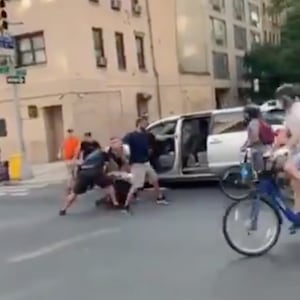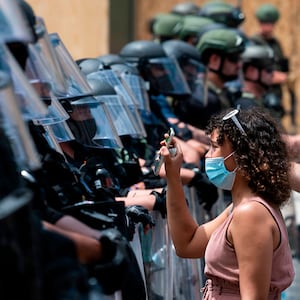If the annual defense bill triumphs over President Donald Trump’s veto threat, one of its measures will enshrine a direct rejection of his response to this summer’s mass protests for Black liberation. No longer will federal police forces be able to conceal their identities when summoned to respond to civil disturbances.
It’s the work of an Air Force veteran and freshman congresswoman from Pennsylvania, Rep. Chrissy Houlahan, a member of the House Armed Services Committee. Houlahan is a Democrat, but she gives credit to a Michigan Republican, Paul Mitchell, for helping craft and improve a provision that will stop federal law enforcement from being used like the so-called “little green men” of Ukraine–Russian-backed forces that concealed their identity for deniability.
“Many people, myself included, were alarmed by seeing, whether it was in Portland or on the stairs of the Lincoln Memorial” a phalanx of security forces and “being unable to know who those people were and what organizations they were with,” Houlahan told The Daily Beast on Tuesday, shortly before the House vote on what’s known as the National Defense Authorization Act (NDAA).
ADVERTISEMENT
The incognito security-force deployment, particularly in Washington, D.C. in June, was the work of Attorney General William Barr. Barr effectively assembled a militia out of prison guards from the Bureau of Prisons and other Justice Department components. Bolstering them were officers from the Department of Homeland Security’s Immigration and Customs Enforcement and Customs and Border Protection, who were deputized as U.S. Marshals.
But the public, for several tense days on Washington, D.C. streets, had no way of knowing who the minimally-identified security forces were, what legal authorities they operated under, and what distinguished them from an armed gang.
In response, Houlahan crafted an NDAA amendment that at first barred the use of unidentified security officials during an invocation of the Insurrection Act of 1807. That act, which Trump threatened to exercise, empowers presidents to use the military in extraordinary domestic circumstances. The Pentagon leadership, after first wavering, rejected an active-duty role in suppressing the protests.
Accordingly, Houlahan and her allies broadened the measure. It now requires identification of all security forces by name or unique identifier and “the armed force, Federal entity, or other organization by which such individual is employed” under all circumstances when “a member of the armed forces (including the National Guard) or Federal law enforcement personnel provide support to Federal authorities to respond to a civil disturbance.”
Houlahan was encouraged by bipartisan cooperation on the amendment. She particularly credits Mitchell, whose son is a police officer. “Why Mr. Mitchell and I worked so well together was that we wanted to both protect civilians and we also wanted to protect those people who are in uniform, whether they are law enforcement from our communities or whether they are National Guard, etc.,” she said. “We wanted to make sure that in crisis situations that are super murky to begin with, everybody was able to understand who was out there so everybody could be as safe as possible.”
Mitchell’s office did not respond to a request for comment.
Trump has threatened to veto the NDAA over an unrelated spat with social-media companies for challenging his disinformation about his election loss. Several of his GOP allies on the Hill have urged him against vetoing the quarter-trillion-dollar funding bill. The senior Republican on the House Armed Services Committee, retiring Rep. Mac Thornberry of Texas, has said that Congress will override any veto to pass the NDAA.
But early in the process, Houlahan said that she received positive indications on her amendment from Mark Esper, the defense secretary Trump recently fired who opposed a military crackdown on protesters. The receptivity to the anti-Little Green Men measure gives Houlahan, who comes from a military family, confidence in the resilience of constitutional institutions that have long taken a battering from multiple forces.
“We’ve seen some vulnerabilities in our institutions over the last few years that regardless of what party you’re part of should worry people,” Houlahan said. “To the degree that we can self-correct our democracy, it’s good, it’s very hopeful. This is one thing we’ve been able to do, and I expect there will be others as well that would be able to shore up the institutions that we all love so much.”






